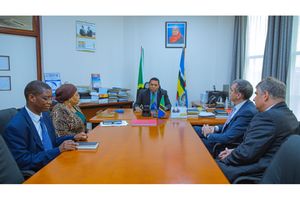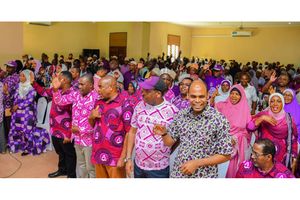Tanzania the biggest recipient of our support, says Jica chief

Jica chief Representative Toshio Nagase at his office in Dar es Salaam.PHOTO|FILE
What you need to know:
- Among them, is an eastern Asia country--Japan. Apart from having an embassy here, an island nation in the Pacific Ocean has an umbrella organisation named Japan International Cooperation Agency (Jica), which facilitates and coordinates development support in to the country.
Tanzania is enjoying relations with many countries, which in one way and another, contribute significantly in furthering economic and social welfare.
Among them, is an eastern Asia country--Japan. Apart from having an embassy here, an island nation in the Pacific Ocean has an umbrella organisation named Japan International Cooperation Agency (Jica), which facilitates and coordinates development support in to the country.
The Citizen reporter, Deogratius Kamagi spoke to Jica chief representative to Tanzania Mr Toshio Nagase, who gave details of what the Japanese agency is doing in supporting development of the country. Jica started its operation in Tanzania in 1962.
Question: What are the key projects that Jica has implemented so far since it was established in Tanzania?
Answer: Jica has done many things. We mainly focus on agriculture, education, water services, power supply and infrastructure.
Jica’s assistance to the agricultural sector focuses primarily on two pillars, which include strengthening the Agriculture Sector Development Program (ASDP) as implemented by the ministry agriculture.
This is implemented through a programme namely District Agricultural Development Plan (DAPD), which is the main component of ASDP that promotes agricultural development at district level.
Secondly, we are improving rice cultivation technology and irrigation project provided that Tanzania is one of the first group of countries in the Coalition for African Rice Development (CARD) and is implementing the National Rice Development Strategy (NRDS), which aims at doubling rice production from 0.89 million tonnes in 2008 to 1.96 million tonnes by 2018.
Our interventions on transport and infrastructure are three-fold: Firstly, enhancing the national transport network, which covers all the transport models including road, railway and port in terms of infrastructure development and rehabilitation, some of the projects that are under us are Salender Bridge, Kilwa Road, New Bagamoyo Road and Tazara flyover.
These are being implemented along with supporting urban transport master plan formulation and inter-ministerial coordination mechanism development as well as assisting capacity development relating to rural road maintenance and development through technical cooperation, which include promotion of Labour Based Technology (LBT) that can provide road improvement and job creation at the same time.
What are the priority areas in Jica’s development budget for projects in the country?
We have three priority areas, which are in line with the commitment to the achievement of the Sustainable Development Goals (SDGs), the areas in question are economic growth towards poverty reduction, here we have are promoting agricultural and industrial development.
Secondly, infrastructure development for sustaining economic growth and poverty reduction through improving electricity and energy, transport and traffic as well as water supply and water resources management.
Lastly, improvement of public services to all citizens via local government reforms support, public financial management, strengthening health and education system.
What’s the annual budget for Tanzania from the Official Development Assistance (ODA) from Japan?
The budget ranges between $100 million and $300 million depending on the activity being implemented in a respective year.
Tanzania is leading top three of the largest recipients of Japan’s ODA to Sub Sahara Africa in the past six years (2010-16). So far it has received $1026.64 million, followed by Kenya and Ethiopia.
The money in question is in three categories Grant aid ($494.14 million), Technical assistance ($194.34 million) and Loan aid ($338.16 million).
In 2015, Tanzania was the third largest recipient of Japan’s ODA to Sub Sahara countries as it received $106 million out of $1,672.13 million that was allocated. Kenya received $249.88 million while Angola got $220.55 million.
Why is Japan’s economy superior compared to Tanzania? And in your opinion what areas do you think Tanzania can learn from your country?
There is a very big heritage that we inherited from our fathers who came all the way from 1600-1900 years. It wasn’t in term of war between those years, there was no civil wars which pushed a lot of economic activities and trade within the country, we were able to learn a lot from western leading economies by then and ensure that Japan isn’t colonised, even after the war, we were able to re-build our damaged infrastructure and have back our lost economy.
This lesson should also be learnt in Tanzania that there must be good and viable social services such as health, education and infrastructure, which together assure public service delivery.
What achievements has Jica attained in supporting local government administration?
One of the recent remarkable achievements is to reform the Local Government Development Grant (LGDG) which is a fiscal transfer mechanism from the central to the local government.
The reform process was initiated by the President’s Office-Regional Administration and Local Government (PO-RALG) in which the contribution by Jica experts was to facilitate the situation analysis on the previous LGDG and input various options of central- Local fiscal transfer mechanism with introduction of Japanese experiences. To create a better environment for more effective local governance, Jica provides leaning opportunities for leaders of PO-RALG, regions and Local Government Authority (LGA) through a training programme in Japan and Tanzania.
As of today, 20 leaders have visited Japan and more than 5,000 local government leaders were their experiences of the study programme they trained in Japan.
The network of those leaders is sustained even after the return from Japan and completion of training programme. This network is called Tanzania-Osaka Alumni (TOA) named after the location of training programmes in Osaka city, Japan.
The projects basically touch on the idea of Mwl Julius Nyerere that people cannot be developed, but develop themselves.
We all know that Tanzania is running short of budget and local government is highly depending for the fund from central government so that they can set their priorities and implement with the limited amount and human resources.
Do you have scholarship opportunities for Tanzanians from poor families and professions that are relevant now?
We have a special programme namely African Business Education (ABE) Initiative for youth. This programme offers opportunities for young and eligible African men and women to study Master’s degree courses at various Japanese universities as international students and to experience internships at Japanese enterprises in order to develop effective skills and knowledge in various fields for contributing the development of industries in Africa.
Beneficiaries are being given full scholarships for a maximum of two years. Then, they are required to undergo internship programmes in Japanese institutions and companies for a period of between three weeks and six months, depending on the needs of the firms.
The programme started in 2014 and so far a total of 81 Tanzanians have benefited, 29 in 2014, 32 (2015), 12 (2016) and 8 in 2017.
Why is the number of beneficiaries for ABE Programmes from Tanzania going down every year?
Yes, the number has recently being reduced but it should be understood that the programme is carried for all Africans who are interested and apply. In the beginning not all Africans knew about it so the opportunity was given to members of countries, who were interested, majority from Tanzania, South Africa and Mozambique. These countries had a very good start.
As days go on, many countries came to attention about it and developed an interest, and came to apply, that is a very simple reason. What they have to do is increase their entries.
How do you see the economy of Tanzania?
The Tanzania economy it is now in the transition period from low to middle income economy country, and I have seen a lot of things start moving so quickly… It is promising in deed.
Most of new projects have come up including infrastructures and investment and at the same time the government is trying to improve the business climate.
I have heard from my colleagues who have been here in the past that there were no high rising buildings, network of national trunk roads and other big projects, so there is a big improvement if the comparison were to be made.
How do you see the administration of fifth government?
The fifth Government is showing leadership which is needed for this transition period, there is a strong need drive for anti-corruption, increase of government revenue through tax collection, so in my view, there is progress that touches people’s needs.
At the same time, as you are going in a right direction on providing social services and improve revenue collection, the government must ensure it deliver not only to Tanzanians but also to investors in a way that meets their demands.
I do hope that the government will do the needful as it is doing now, to improve investors’ confidence to complement its industrialization drive.




